Anime Review: Seishun Buta Yarou wa Bunny Girl Senpai no Yume wo Minai
- Feb 13, 2019
- 15 min read

Common Name: Seishun Buta Yarou wa Bunny Girl Senpai no Yume wo Minai
Alternative Names: Rascal Doesn't Dream of Bunny Girl Senpai, Seishun Buta Yarou
Score: 10/10, 5/5
Length: 13 Episodes
Genre: Romance, Drama, Comedy, Supernatural, School Life, Harem
Summary: Azusagawa Sakuta, a second-year in high school, is what you might call a loner. He has two people he can call his friends and doesn't generally go out of his way to be amicable or sociable with anyone else. His lack of popularity, of course, isn't bolstered by the nasty rumors that are being spread about him throughout the school--claiming that he's some kind of violent gangster who has sent people to the hospital. Sakuta has little interest in clearing up that misunderstanding, though, since no one would ever believe the truth; at least, not until he encounters a wild bunny girl wandering through the library without anyone but him noticing her. Like him, Sakurajima Mai, a child star who has quit show business to live a normal life, is suffering from a phenomenon called "puberty syndrome" that is unique to each person afflicted. In this case, Mai is steadily vanishing from the public consciousness in both the literal and metaphorical sense. Determined to help this girl who might just get erase her from the world entirely thanks to the affliction they both share, Sakuta decides to finally put himself out there if it means saving her and anyone else afflicted with puberty syndrome.
Review: Before I inevitably devolve info fangirling over this show, because it deserves nothing less, I believe I should make one point of contention clear: Bunny Girl Senpai isn't perfect. While I have said so in the past, I'll reiterate that my giving a show a 10/10 does not indicate that it is flawless. Every show has flaws both obvious and contextually sensitive; that is just an unavoidable fact. Like Steins;Gate before it, Bunny Girl Senpai struggles with its more supernatural leanings. Rather than being a tonal issue born of the stated goal disagreeing with the facts of the characters' actions, though, this show runs into a problem simply with its internal logic. Namely, the explanations offered to rationalize each arc's bit of supernatural phenomenon never really seem to perfectly or wholly explain the nature of puberty syndrome.
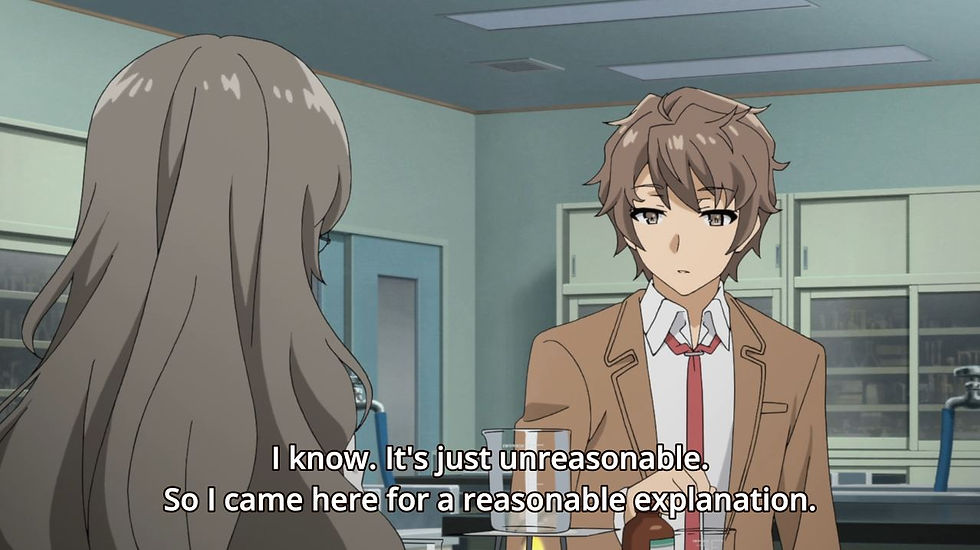
It's a niggling complaint, I know, but it stands to be the only complaint I can level at this show, even if it is one that I can easily justify when all is said and done.
Specifically, whenever the main cast tries to puzzle out the nature of each arc's unique case of puberty syndrome, the explanations given ultimately feel like they fall short. Everything from Nietzsche's concepts on social philosophy to legitimate psychological illnesses and some more general ramblings on quantum mechanics is cited as a possible cause of each case. The show even goes so far to offer these hypotheses and then back them up with a few scenes to contextualize and justify the conclusion that that is the real answer. Yet, there's never any cohesion between these individual instances of puberty syndrome apart from the fact that they all happen around Sakuta, but that's more of a staple of storytelling than it is an explanation. So, the issue at large is never actually "solved"--a fact that could potentially irk a lot of people. The bigger problem, however, is that these assumed answers are rarely ever perfect or definitive. There's always some loose thread here and there or a factor of the syndrome glossed over to fit the more easily accepted answer. Your standard viewer might just take that explanation at face value and move on since most people aren't psychology/philosophy majors or astrophysicists. For anyone familiar with these concepts, though, it's hard not to pick apart each explanation proposed by the cast--as noted by the myriad of Reddit posts on the subject--and find that it comes just short of the mark or misses it entirely.
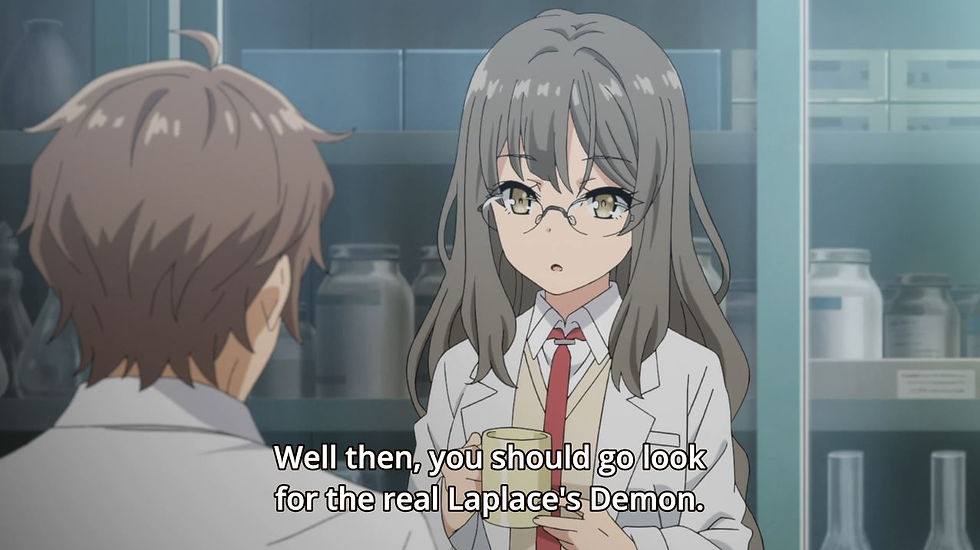
To think, if this was actually the Monogatari clone people claim, Sakuta would be hunting down
a literal demon, rather than a someone whose puberty syndrome vaguely reflects a scientific proof that's been out of vogue for several decades now.
To be fair, though, the show does repeatedly state that the characters are working with incomplete knowledge, considering that they are high schoolers. In part, this is meant to make hand-waving away any loose threads or unaddressed conflicts with the theory easier. It allows for the assumption that there is likely some facet of the greater argument neither the characters or the author is familiar that would perfectly justify the given explanation. On the other hand, however, it also sets up a far more likely belief that we are working with unreliable narrators who are forced to draw conclusions where none might exist. This is, of course, very human behavior on Sakuta's part--seeking a means to rationalize a problem outside of his realm of understanding. Yet, in the end, all this asking and questioning does is leave us without any kind of satisfying conclusion. Answering the "why" of the puberty syndrome problem is made obvious but not the "how." For all the half-baked hypotheses and conclusions for each case, we get no closer to understanding the overall condition. And that's ultimately where this problem leads. Had the show not drawn attention toward trying to "solve" this supernatural phenomenon, it would have been easier to just accept it and move on--especially since these phenomena are very mundane.

Assuming you call an arc that's basically an Endless Eight reference mundane.
That said, the entirety of my one complaint does admittedly stand on very shaky ground. It is entirely possible, after all, that the coming movie will actually manage to explain everything. What's more likely and appropriate, though, is to say that this flaw was intentional because it does speak to the show's overall narrative on the stresses and vagueries of adolescence. As much as I want to complain, it's incredibly easy to justify why there's little to no correlation between each case of puberty syndrome: no two people experience adolescence the same way. Easy as it might be discount, generalize, and outright ignore puberty as "just something everyone goes through," everyone experiences this point in life differently due to any number of internal and external factors. So, it makes sense that Bunny Girl Senpai expresses these unique experiences and problems through supernatural phenomenon that the cast is forced to rationalize with incomplete information. For all intents and purposes, adolescence might as well be supernatural for those who are going through it and watching it happen. Physically, chemically, socially, people are in a state of near-constant change and oftentimes those changes can feel like they come on instantly, as if by magic. All the more so when you see another person go through that change since you might not be able to really understand what cocktail of factors brought that about. All the more so when you're forced to play quantum chess to understand everything from what they're internally going through to how they might react to other people's reactions and how they might react to thinking about how they might react to other people's reactions.
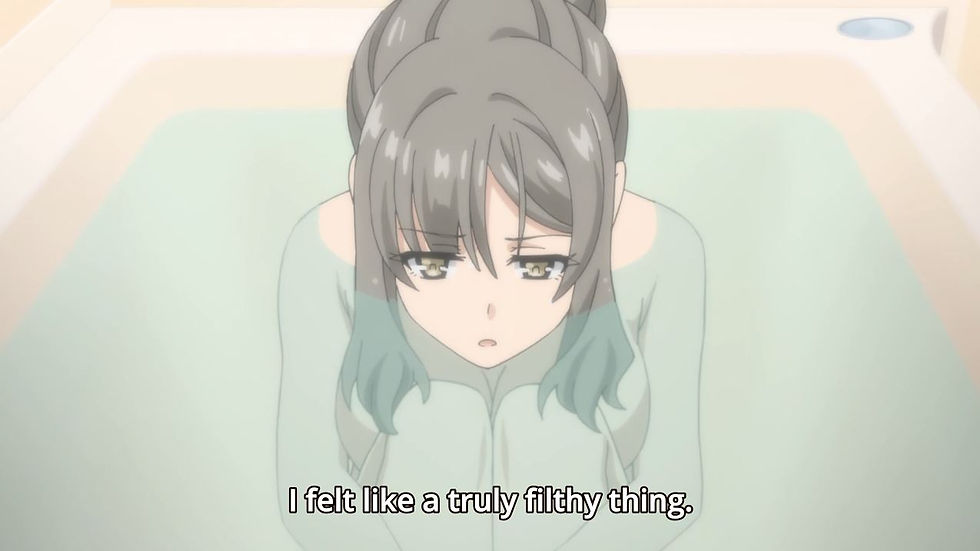
Bottom line: puberty is tough. Whether people are going through it "normally" or with the added stress of dealing with a supernatural manifestation of that stress, puberty is tough.
Alright, now that I've accomplished my personal goal of giving this review the longest introduction yet and thoroughly elaborate on the single issue I have with this show, it's time to let the fangirl within me loose. So, let me be blunt, I love Bunny Girl Senpai. For me, it is the ideal blend of down-to-earth character drama and anime bullshit. What's more, it manages to work its way through a lot of the standard shounen harem tropes without actually succumbing to the self-serving wish fulfillment that would otherwise ruin the impact of what this story is trying to do. We're given enough to grow attached to the cast physically and emotionally but only to get us invested in each story and the lessons each arc has to tell. It might take some character more time than others to reach that level of appreciation but it does come eventually for pretty much every member of the cast. So, it should come as no surprise that I love this show. After all, it actually took the time to craft legitimately good characters rife with personality and flaws and the little ticks that make them worth remembering. If a show is willing to put forward that level of effort, giving it a chance is the least I can do.
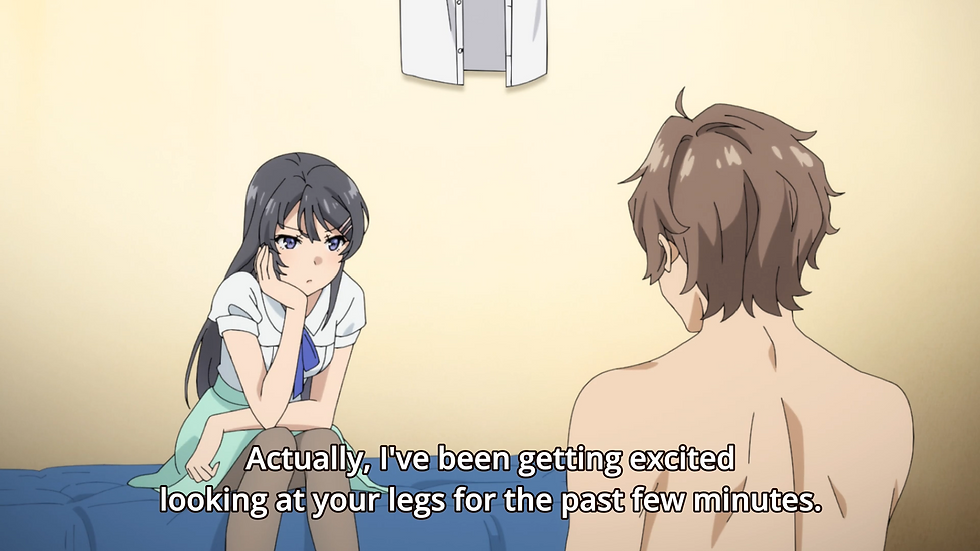
And believe me when I say it needed that chance at the start.
While I believe I expressed this in one of my Seasonal Stirrings, I feel the need to reiterate something: at this show's start, I had zero faith in what it was trying to do. It was setting off alarm bells left and right with how forward Sakuta was the first arc's damsel in distress, Sakurajima Mai. Almost immediately, I wanted to put it down simply because it was giving me High School DxD Heroes flashbacks but there was something about the banter between these two the piqued my interest. At the show's start, our main character, Azusagawa Sakuta, comes across like many protagonists in romantic series. He's essentially a loner who has detached himself from the world around him in the interest of making his own life easier, a blank slate that someone can easily slip into to enjoy the girls that will inevitably surround this character. This feeling only grew as he encounters the first girl in his harem, Mai, and proceeds to white knight his way through puzzling out her problem--a problem that he is uniquely qualified to solve.
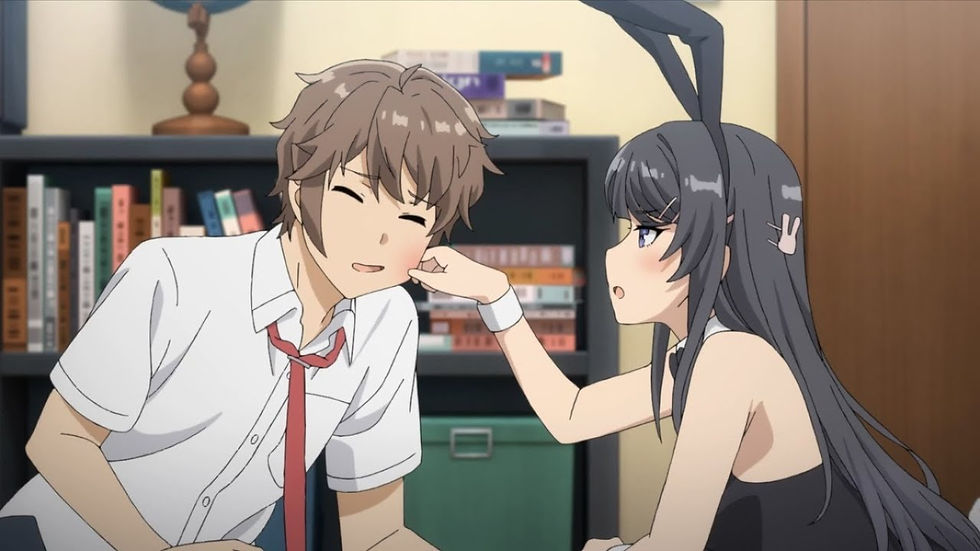
What a pretentious, presumptuous little shit, am I right?
So, it almost goes without saying that I actively disliked Sakuta as a character for some time. But then something slowly started to happen. As the tension and drama of the show's first arc started to build, Sakuta's role within the show steadily began to change as well. As he spent more time with Mai, he started to express himself more and more in a way that directly contradicted his characterization as a cynical blank slate. With little emotional ticks that spoke to things we, as the audience, didn't know about him yet and his blunt, self-deprecating, flirty banter that isn't normally seen in blank slate characters, it eventually became clear that Sakuta had been a character all along. What's more, it revealed that it might not have been his perspective we were supposed to look through. Perhaps the idea was for us to regard and consider Sakuta in much the same way Mai does at the show's start.
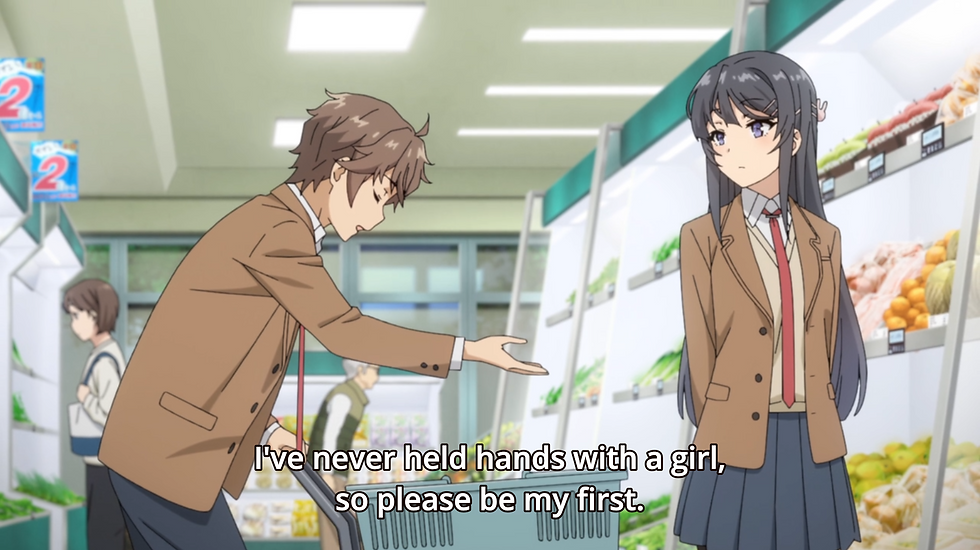
What an absolute dork.
Much like he is for us, Mai is put in a position where she is forced to regard Sakuta like any other guy. She is just as unfamiliar with his past and his rationale for being a loner as we are. All we know of him are the things that are seen on the surface--the person, presumably, that he wants other people to see since he has no interest in really putting himself out there. And, to be frank, based on that first impression, there really isn't much to him. Then, as Mai's problems start to make themselves known, it's easy to see his desire to help her in a negative light. After all, it's not likely that he'd do so without some self-serving ulterior motive. However, in spite of his very forward behavior and supposedly unfounded belief that he can solve a personal problem even she can't understand, he doesn't actually do anything other than put himself out there as someone willing to help. Thus, as she slowly comes to trust his good intentions and open up to him more, we get to see more and more of who Sakuta really is. Yet, oddly enough, the resolution of who he is a rather simple one: he's human. As we see more and more of Sakuta puzzling out how Mai is steadily vanishing from everyone's notice, we see that, yes, he is helping her out of some self-serving desire but is only willing to do so much as she will let him. He pushes to make himself stand out more in her mind and thus make her more willing to at least humor his attempts at help but doesn't strive to actually initiate anything. So, while she might be right about him in some ways, she also sees how wrong she might be as he proves himself to be someone worth liking time and again.
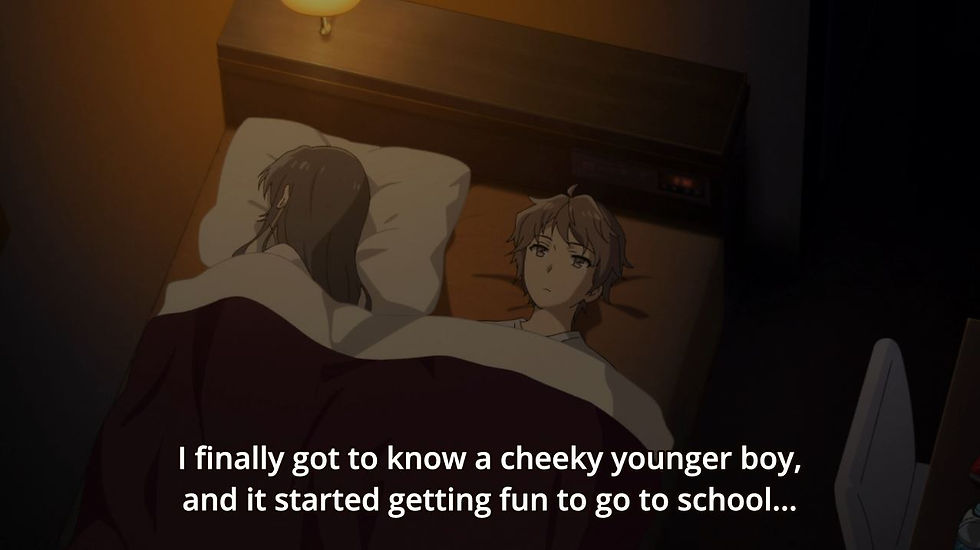
And, thus, we get to learn more and more about her as well.
Through this odd kind of back and forth between the cast, we are introduced to and grow attached to every member of the show's cast. It starts with the back and forth between Mai and Sakuta as they bounce off of one another to fully realize each other's personality and problems. Then, as that arc ends and others begin, we are given reason to care about the rest of the cast simply because Sakuta or Mai care about them for any number of reasons, leading into yet another game of back and forth. What's particularly interesting about Bunny Girl Senpai, though, is the way that it manages to feed every subsequent arc into a means to further establish and deepen the established relationship between Mai and Sakuta. True as it might be that this show is grounded in the harem genre, it never actually deviates from the main pairing. Yes, we're introduced to a collection of female characters and are given reasons to like them both for their character types and body types, because Sakuta would obviously take note of those things as well, but he approaches them all for a variety of different reasons.
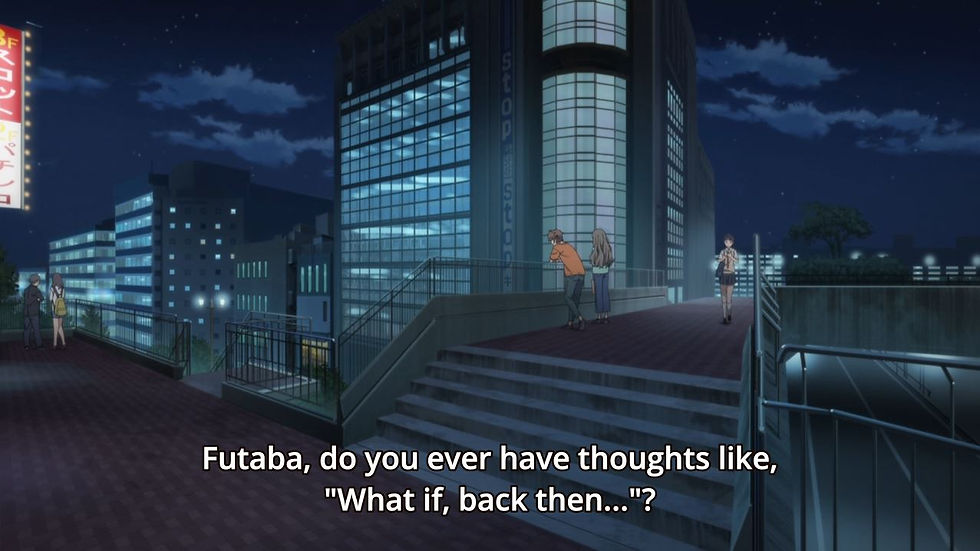
Now there's a thought that gets a lot of mileage on Sakuta's part.
For instance, Koga Tomoe's arc is instigated by Sakuta purely because her situation reminds him of what led to his sister developing puberty syndrome and becoming a NEET just to cope with the trauma she suffered. Yet, while that arc eventually takes the romantic lean you'd expect, Sakuta goes out his way to make the right choice both for himself and everyone else. For starters, he goes out of his way to make sure his helping Koga won't get in the way of his relationship with Mai, laying out his rationale from the start. Secondly, he works to let her down in such a way that she'll both understand his position and work to solve her problems without relying on him or anyone else to solve things for her. Lastly, in his working to help her move past her reliance on him, he is helping himself resolve his personal hangup about being unable to help his little sister in her time of need. Of course, while helping Koga doesn't really help Kaede's situation, what it does do is give Sakuta the confidence boost he needs to believe that he might be able to help if it happens again.
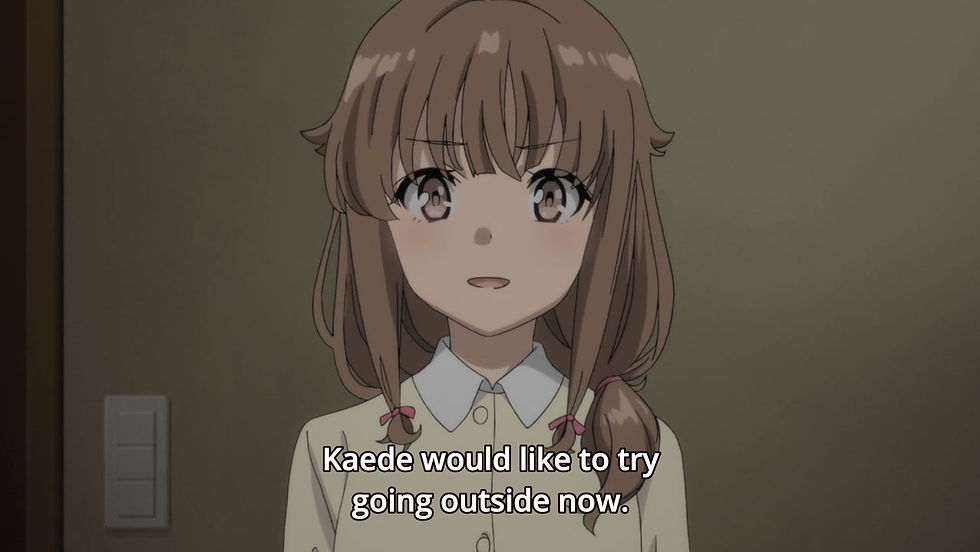
And, ho boy, that personal training pays dividends when Kaede's arc rolls around.
Through these subsequent arcs, we are obviously introduced to a cast of characters whose stories all reflect on one another in various ways. What we also get, however, is a further exploration of the show's main pair from a number of angles. Through Mai, we start to learn a few things about Sakuta and vice versa. Through Koga, we see how Sakuta selectively invests himself in other people's problems based on his own desires and problems. Simultaneously, though, this arc plants the seeds for our eventual understanding of his complex relationship with his invalid sister. Then, through Futaba's arc, we see the dedication Sakuta shows those who prove themselves as his friends. Nodoka's arc establishes Mai's personality and history further while also showing just how much Sakuta is willing to force himself into his girlfriend's personal affairs. Then, lastly, Kaede's arc shows us what Sakuta is like when he's hit true rock bottom. Of course, saying all these arcs only serve to further develop the main pair does their central figures a disservice. All of them are fantastic in their own regard and show a level of thought and attention on the same level as Sakuta and Mai during that first arc. As they all work to assist Sakuta in various ways, both before and after their arcs are introduced, they are all given their time to shine in their own ways.
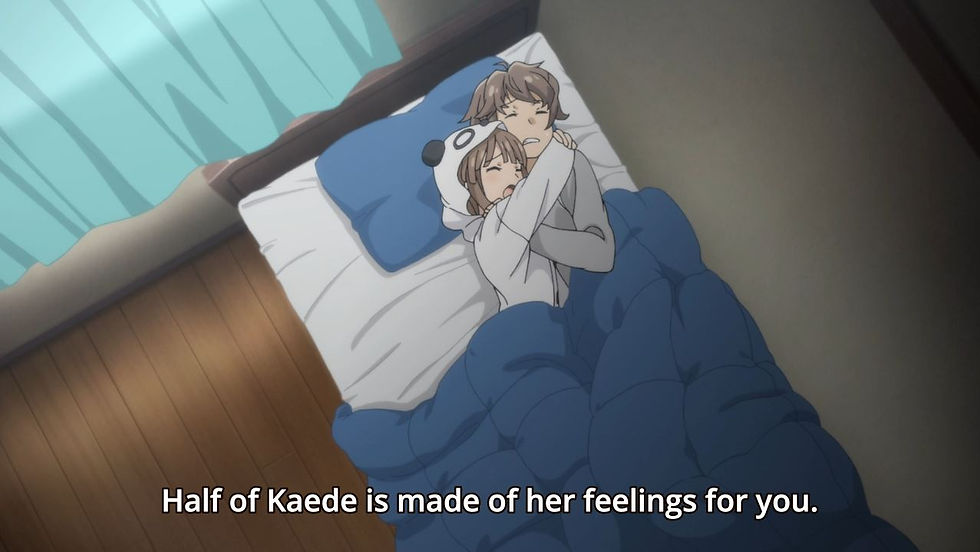
And that's really saying something, considering how Kaede started the show
being just as bad a character as Episode 1 Sakuta.
Great as all the other cast members might be though, half of what makes Bunny Girl Senpai so amazing is the way in which all the arcs feed into each other in various ways. As I've already stated, most of them, if not all, feed into showing off various facets of Sakuta's character as well as his limitations as a person. What they also do, though, is shine some very subtle light on Mai as well. Now, obviously, the primary arcs in which her development is most prominent is her own and her sister Nodoka's. Through the first, we get a solid understanding of who she is and what she really wants out of life--namely, her desire to be a great actress. With Koga, we see her push the boundaries of how much she trusts Sakuta to stay true to their relationship. Futaba's expresses how much she's willing to put herself out there for Sakuta's friends and family. Then, lastly, Nodoka's arc fleshes out the rest of who she is: her past, her relationship with her family, and a good number of her personal flaws. What this arc also offers, though, is a real glimpse into just how much she's willing to open herself up to Sakuta. All too easily, she could shut him down and tell him not to pry into her family matters but, instead, she gives him quiet ascent to dig into matters she'd rather not divulge to others, including her little sister.

Now there's a loaded line if I ever heard one.
The depth of this back and forth doesn't stop there, though. While Nodoka's arc does wonders to show that Mai is willing to open herself up to Sakuta, it also shows just how unwilling he is to reciprocate that openness. While Sakuta might be a good persona at heart, as this show proved time and again, it almost makes it clear that he isn't your average, perfect, "good guy" protagonist. Much like how Mai had secrets she'd rather keep secret to preserve her pride and ensure that Sakuta won't see her flaws and insecurities, Sakuta has a good number of personal problems he's alluded to throughout the show but manages to keep secret from her up until they are divulged against his will. As you might expect, most of those problems are centered around his little sister, Kaede and her own battle with puberty syndrome. So, as Kaede's arc starts to ramp up and Sakuta's unwillingness to be open with Mai is made known, their relationship really put to the test. Especially as things take a turn for the worst in Kaede's arc, Sakuta's determination not to get Mai involved show's just how self-centered and arrogant he can really be. Trapped inside his own head and immersed in toxic masculinity that demands he solve his and Kaede's problems without his girlfriend's help, Sakuta ultimately fails to give Mai a chance to be an equal partner in their relationship. Too self-absorbed to realize that she wants to help him the same way he helped her and so many others, he unintentionally turns their relationship into a one-sided affair just to satisfy is own pride.
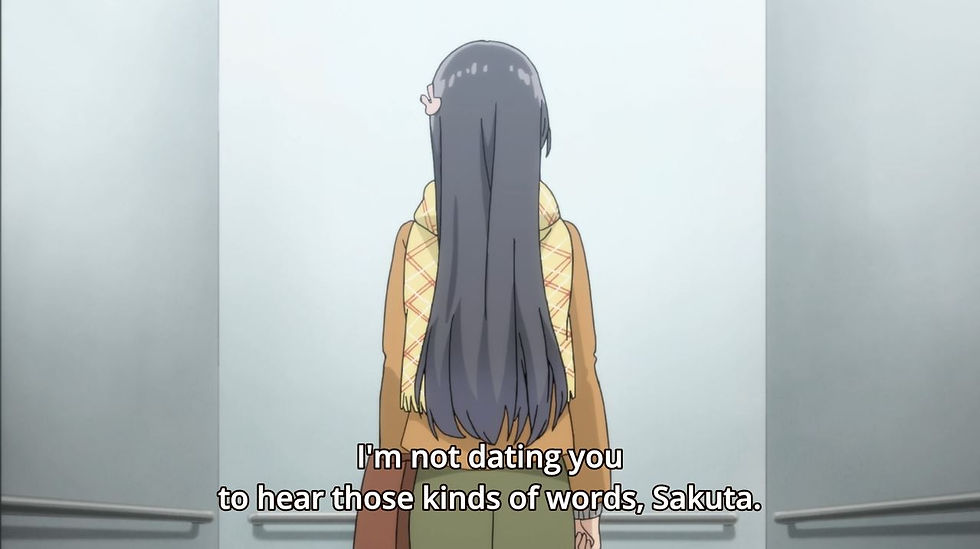
Isn't it sad how ecstatic I am that this show went out of it' way
to actually consider what Mai wants out of their relationship.
It is nothing short of stunning just how much thought and effort went into this story and its characters. Every arc feeds into the other and the larger arc that is Sakuta and Mai's relationship. No character ever feels like a drag on the plot or unnecessary to the ultimate narrative goal of capturing the struggle of growing up and learning letting people be part of your life, even though you might still be a selfish child at heart. There have been only a few other romance series I can think of that come even remotely close to capturing that one part of being in a relationship that so many people never seem to grasp. That fact alone is something that makes this show special, that makes it a masterpiece in my eyes. While all the supernatural stuff might have ended up being a narrative hook and an easy means to express the narrative throughline Bunny Girl Senpai goes for, it doesn't take away from what it ultimately accomplishes. As these two struggle with their personal problems and the problems of those around them, they develop what is easily one of the most compelling, human, and natural relationships I've ever seen in anime. Had their relationship ended over this one issue, I wouldn't have been surprised or even all that broken up about it. The fact that it does end well, though, speaks volumes on how much these two characters mean to each other.
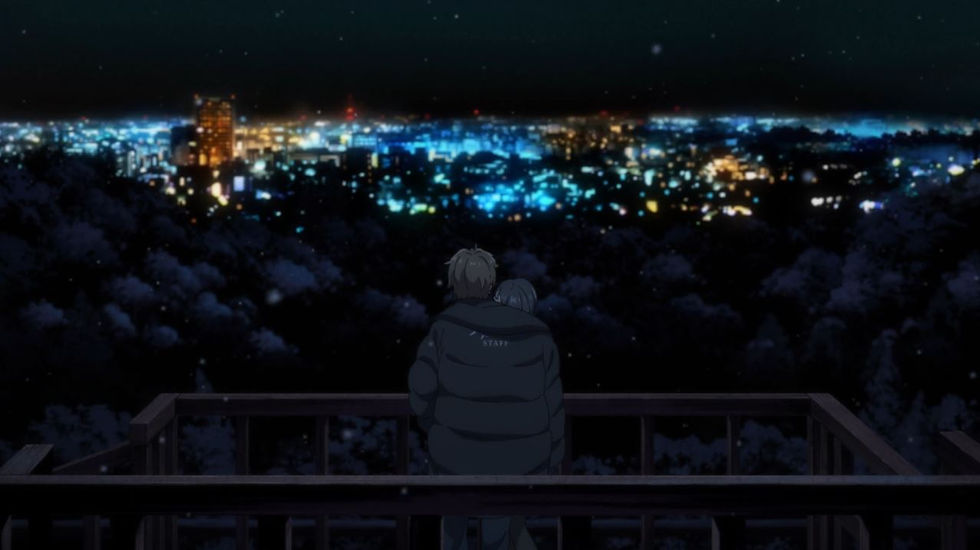
And that, in turn, means the world to me.
Honestly, I don't know what else I can say to convince you how good this show really is. While it might get bashed for being a half-baked Monogatari clone, I see it as something infinitely more valuable because of how down-to-earth and accessible it is by comparison. Yet, in spite of how human its plot and characters are, it doesn't slump in its execution. The art, animation, and music are all as good as they need to be and express the tone and feelings of the characters perfectly. It might not be a SHAFT anime but it's definitely good enough to stand up to most KyoAni titles. Though, if there is one last compliment I can offer this show, it's that revisiting each arc for the sake of this review has only deepened my love for this show. Were it not for that, I might not how noticed just how much each and every chapter of this story feeds into all the others. Things brought up in the end are alluded to from the very beginning and some aspects reflect on others in ways I never caught during my first watch of the series. So, honestly, I cannot recommend this show enough. I might have spoiled a lot of it's more subtle aspects in my fangirling but I made sure to leave some things out so you can really enjoy everything this show has to offer.


Comments